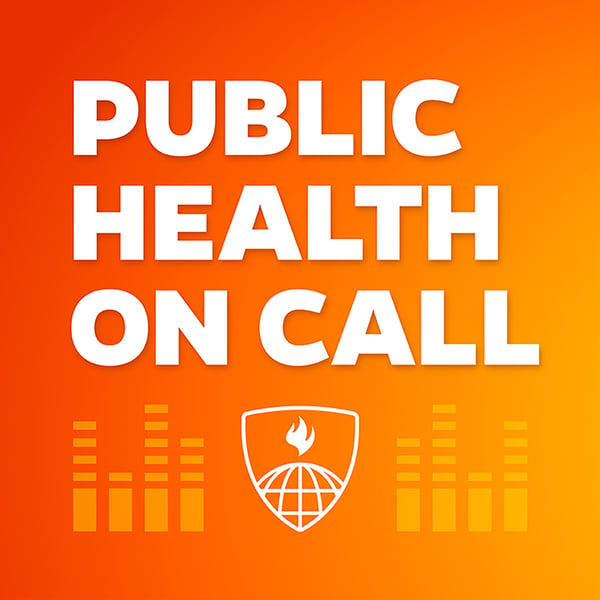878 - Opioid Use Disorder Treatment in the ER
Public Health On Call
The Johns Hopkins Bloomberg School of Public Health
4.8 • 620 Ratings
🗓️ 3 April 2025
⏱️ 16 minutes
🧾️ Download transcript
Summary
About this episode:
People come to the emergency department seeking all kinds of urgent care. What if they could also get treatment for opioid addiction? In this episode: a look at how one rural hospital started prescribing buprenorphine to ER patients, and how scaling up treatment while reducing stigma at hospitals across the US is now helping thousands of patients every year.
Guest:
Arianna Campbell is an emergency department and addiction medicine PA at Marshall Medical Center in Placerville, California.
Host:
Dr. Josh Sharfstein is vice dean for public health practice and community engagement at the Johns Hopkins Bloomberg School of Public Health, a faculty member in health policy, a pediatrician, and former secretary of Maryland’s Health Department.
Show links and related content:
-
USACS Physician Assistant, Ariana Campbell, PA-C, Aims to Eliminate the Stigma of Substance Use Through Education and Intervention—The Shift Blog
-
The New Federal Regulations Aimed At Making Methadone More Accessible—And Less Stigmatizingcvb x—Public Health On Call (April 2024)
-
A New Type of Overdose Response—Public Health On Call (March 2023)
Transcript information:
Looking for episode transcripts? Open our podcast on the Apple Podcasts app (desktop or mobile) or the Spotify mobile app to access an auto-generated transcript of any episode. Closed captioning is also available for every episode on our YouTube channel.
Contact us:
Have a question about something you heard? Looking for a transcript? Want to suggest a topic or guest? Contact us via email or visit our website.
Follow us:
-
Here's our RSS feed
Note: These podcasts are a conversation between the participants, and do not represent the position of Johns Hopkins University.
Transcript
Click on a timestamp to play from that location
| 0:00.0 | Welcome to Public Health On Call, a podcast from the Johns Hopkins Bloomberg School of Public Health, |
| 0:05.9 | where we bring evidence, experience, and perspective to make sense of today's leading health challenges. |
| 0:16.3 | If you have questions or ideas for us, please send an email to public health question at jh.h.u. |
| 0:22.6 | That's public health question at jh.g.u.d. for future podcast episodes. |
| 0:30.6 | This is Lindsay Smith, Rogers. Today, the importance of starting treatment for opioid addiction in the emergency department. |
| 0:38.4 | Ariana Campbell is an emergency department and addiction medicine physician assistant at |
| 0:42.6 | Marshall Medical Center in Placerville, California. She's also the co-founder of the Bridge |
| 0:48.5 | Center at the Public Health Institute, a program that helps emergency departments around the |
| 0:53.3 | country build addiction treatment programs. |
| 0:56.0 | She speaks to Dr. Josh Sharfstein about how this work has evolved over the last decade to become the standard of care. |
| 1:03.0 | Let's listen. |
| 1:04.0 | Arianna Campbell, thank you so much for joining me today on Public Health On Call. |
| 1:08.0 | How are you? |
| 1:09.0 | I'm doing great. Thank you so much for having me. |
| 1:11.5 | I want to talk to you about an effort that I know you have personally been deeply involved with, |
| 1:17.0 | which is getting emergency departments to provide more treatment for people with opioid addiction. |
| 1:24.8 | Yeah, I mean, this has been a big goal for a long time just to have treatment for opioid |
| 1:31.2 | use disorder as a tool in my toolkit. |
| 1:34.1 | And a lot of this stems from feeling somewhat helpless or just not having those tools for |
| 1:38.9 | 17 years of my 25 year career and then making practice change, which, I mean, quite frankly, wasn't that |
| 1:44.9 | challenging and providing this as just a part of practice. My daily routine when I see a patient |
| 1:51.0 | just as if they had high blood pressure, and I would address that, if there's any indications |
... |
Please login to see the full transcript.
Disclaimer: The podcast and artwork embedded on this page are from The Johns Hopkins Bloomberg School of Public Health, and are the property of its owner and not affiliated with or endorsed by Tapesearch.
Generated transcripts are the property of The Johns Hopkins Bloomberg School of Public Health and are distributed freely under the Fair Use doctrine. Transcripts generated by Tapesearch are not guaranteed to be accurate.
Copyright © Tapesearch 2025.

